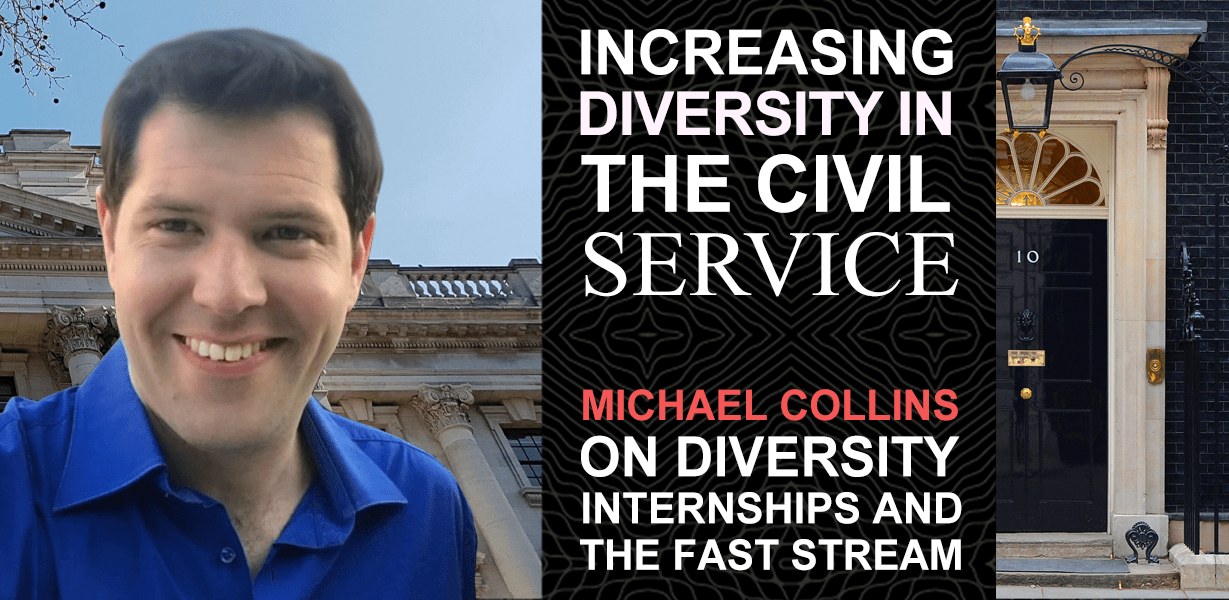Michael Collins is a generalist civil servant and former fast streamer who has worked across a number of Government departments. He is currently at the FCDO where he works on economic diplomacy. Here he talks about the importance of diversity to the Civil Service and shares some insights for those thinking of applying
The Civil Service Fast Stream and the two diversity internships have just opened for applications! Why does the Civil Service run the diversity internships?
I think there are two important principles to consider here: the first is that we have to represent the people were supposed to be representing! That doesn’t just mean things like ethnicity, gender, or other protected characteristics, it also includes being representative geographically or representing a range of skills of a really wide range of the population.
The second principle is a growing recognition that we’re not yet in that place. Some people just don’t perceive the civil service is the right place for them and I think there’s a growing understanding that it’s really incumbent on us to make it attractive. It’s not enough to say, “It’s open, it’s on the website. Anyone can apply” We need to do more. People don’t see it as a fully open process, and we need to be actively trying to attract them
What do you think are the reasons that people might think the Civil Service is ‘for them’ or ‘not for them’?
I think that’s quite a difficult question for me to answer because for me it was really clear, I always wanted to work for the Civil Service! But I know that’s not the case for everyone. I think one thing is that the civil service is enormous and it’s quite nebulous. It covers everything from local agencies to the NHS. It’s easy to get a bit lost or not even be sure what it actually means to work for the Civil Service.
And I think there’s a perception in the media that the Civil Service is for people from a particular background; people who are perceived to traditionally ‘hold power‘ and make decisions.
And then in common with other employers I think there are some really practical barriers. Actually, I think we hold up quite well in comparison with other employers in terms of things like flexible working. But an example of those practical barriers is the cost of attending an in-person assessment centre, in terms of time and money spent travelling. That used to make it very hard for some people around the country to attend. The assessment centre is online now so I think that’s a really positive improvement.
I think that’s the message really, we want the person with the best skills for the job- whoever they are and whatever background they come from.
What would you say to people who are unsure whether the Civil Service is for them?
I would say it’s even more necessary you apply. There is no ‘type’ of person the Civil Service is looking for. I went through a few assessment centres- I applied to the Fast Stream more than once- and in one of them I was chatting to another candidate and I asked what her degree was in and she told me she didn’t have a degree, she was a baker. Once the Assessment Centre started it just became so clear that she was by far and away the best candidate and she absolutely walked through. She had all the skills the Civil Service wanted. I think that’s the message really, we want the person with the best skills for the job- whoever they are and whatever background they come from.
What things are Civil Service doing to support people in bringing their full authentic self to work?
There’s a whole programme of work that’s happening in the civil service at the moment, looking at how to support people in bringing their authentic self to work. It is something we are really interested in. I’m not in the group working on that but personally, I’d say that every department I’ve worked in has had a number of networks and talent accelerator schemes that aim- not just to get people in- but to turbo charge their careers. Even once people get in, they might think that perhaps the next promotion isn’t for them or their skills might not be recognised and there’s really a lot of work happening to ensure that people are being supported. Some of those networks and schemes are built around recognised protected characteristics but new employee networks and support schemes are being developed all the time. For example, there are networks for people from a socio-economically disadvantaged background or neurodiversity networks.
What would be your top tip for people considering applying for Civil Service (internship/FS or directly?)
I would say just go for it! Get in touch with someone who’s already doing the job and ask what it’s like. (You’re welcome to get in touch with me through alumni career connect)
I’d also like to pass on a tip that I got from my DOS when I was applying: you should be trying to convey ‘a quietly considered expertise.’ I really agree with that, there’s no room for brashness in the Civil Service so bringing some humility and some self- reflection is really going to pay off.

